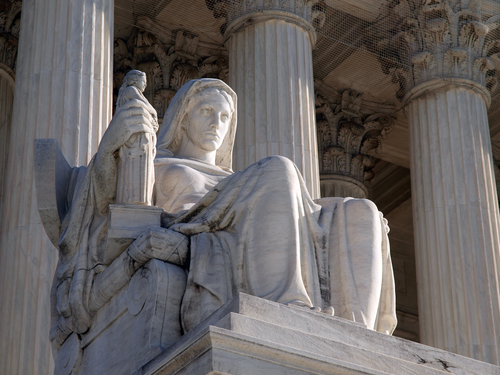Harris v. Viegelahn
Debtor Who Converts to Chapter 7 Is Entitled to Return of Funds Not yet Distributed By Chapter 13 Trustee
By Michael L. Moskowitz and Melissa A. Guseynov
 On May 18, 2015, in Harris v. Viegelahn, the United States Supreme Court unanimously held that undistributed plan payments made by a debtor from his or her wages, and held by a Chapter 13 trustee at the time of the case’s conversion to Chapter 7, must be returned to the debtor. Harris v. Viegelahn, 135 S.Ct. 1829 (2015). The decision resolves a Circuit split, as well as an issue that has divided bankruptcy courts for decades.
On May 18, 2015, in Harris v. Viegelahn, the United States Supreme Court unanimously held that undistributed plan payments made by a debtor from his or her wages, and held by a Chapter 13 trustee at the time of the case’s conversion to Chapter 7, must be returned to the debtor. Harris v. Viegelahn, 135 S.Ct. 1829 (2015). The decision resolves a Circuit split, as well as an issue that has divided bankruptcy courts for decades.
Debtor filed a petition for relief under Chapter 13 of the Bankruptcy Code in the United States Bankruptcy Court for the Western District of Texas. Following plan confirmation, debtor elected to convert his case to Chapter 7. Shortly after conversion, the Chapter 13 Trustee, who held $5,519.22 of debtor’s post-petition wages, paid her own fee and distributed the remaining funds to creditors.
Debtor sought the Bankruptcy Court’s assistance in recovering the funds, claiming the Trustee lacked the requisite authority under the Bankruptcy Code. The Bankruptcy Court granted debtor’s motion and the District Court affirmed. The Fifth Circuit reversed, concluding that, due to “considerations of equity and policy,” the creditors’ claims to the funds were stronger than any such claims of the debtor. Because the Fifth Circuit’s holding conflicted with the Third Circuit’s holding on the same issue, the Supreme Court granted certiorari to resolve the split.
Justice Ginsburg, writing for the Court, explained the different ways in which post-petition wages are treated in Chapter 13 and Chapter 7. In Chapter 13 cases, where a debtor retains assets subject to a court-approved repayment plan, post-petition wages constitute property of the estate and are collected by the Chapter 13 Trustee for distribution to creditors. Conversely, in a Chapter 7 case, where a debtor’s assets are liquidated and the proceeds distributed to creditors, a debtor’s post-petition earnings belong to the debtor and do not become property of the estate.
Here, the Court first noted that section 348(f) of the Bankruptcy Code provides that, if a case is converted in bad faith, a debtor’s post-petition wages may be made available for liquidation and distribution to creditors. See 11 U.S.C. § 348(f). On the other hand, when a conversion is made in good faith, there is no such penalty. Secondly, section 348(e) of the Bankruptcy Code states that conversion of a case from Chapter 13 to Chapter 7 immediately terminates the service of the Chapter 13 trustee. See 11 U.S.C. § 348(e). Thus, the Court held that the Chapter 13 Trustee improperly continued to act in her capacity as trustee even after the case was converted to Chapter 7, despite being prohibited from doing so by section 348(e). As a result, the Court concluded that the accumulated post-petition wages distributed by the Chapter 13 trustee after conversion must be returned to the debtor.
The Harris decision, which makes clear that all funds held by the Chapter 13 trustee as of the date of a conversion must be refunded to a debtor, directly affects creditors who would have received funds under a debtor’s Chapter 13 plan. Significantly, a trustee who distributes payments regularly may have little or no accumulated funds to return, whereas a trustee who distributes payments infrequently may have a larger sum of money to return to debtor at the expense of creditors. Because of this potential issue in conversion cases, Justice Ginsburg concluded the opinion by noting that “creditors may gain protection against the risk of excess accumulations in the hands of a Chapter 13 trustees by seeking to include in a Chapter 13 plan a schedule for regular disbursement of funds the trustee collects.” Harris, 135 S.Ct. at 1839-40.
About Weltman & Moskowitz, LLP, A New York and New Business, Bankruptcy, and Creditors’ Rights Law Firm:
Founded in 1987, Weltman & Moskowitz, LLP is a highly regarded business law firm concentrating on creditors’ rights, bankruptcy, foreclosure, and business litigation. Michael L. Moskowitz, a partner with the firm, focuses his practice on business and bankruptcy litigation, as well as creditors' rights, foreclosure, adversary proceeding litigation, corporate counseling, M&A, and transactional matters. Michael can be reached at (212) 684-7800, (201)794-7500 or mlm@weltmosk.com. Melissa A. Guseynov is an associate of the firm.







